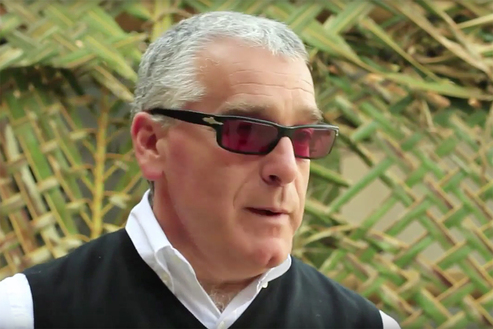
R
E
V N
E
X
T
The inaugural edition of the Anren Biennale recently released its ambitious roster featuring more than 120 participating artists from over 20 countries. Scheduled to take place from October 28 to February 28, 2018, in the historical town of Anren in Chengdu, China, the presentation is being overseen by the prominent art historian and critic Lu Peng, who has divvied up the gargantuan spectacle into four thematic exhibitions. Brought together under the umbrella concept of “Today’s Yesterday,” each segment will deliberate on the ways histories are contested, reflected and revisited in today’s art, cultural criticism and politics, and will be headed individually by Chinese and international curators who will drive the respective curatorial visions.
Working at the cultural crossroads between East and West, the artistic director of the FM Centre for Contemporary Art, Marco Scotini, will curate an interdisciplinary segment “The Szechwan Tale: Theater and History” which investigates the boundaries between fictional theater and real history. The show will use the imagined background of Szechwan (or Sichuan) as portrayed by the German playwright Bertolt Brecht in his play The Good Person of Szechwan (1940) as a departure point. It will also reexamine Rent Collection Courtyard (1964)—a powerful life-sized socialist realist sculpture originally based in Anren, which stood as a testament to the Cultural revolution, and was once hailed as an “artistic atom bomb” when replicas appeared in different Chinese cities as well as overseas—to raise questions on the legitimacy and continuance of art and its connection to the past, present and future.
“Crossroads,” curated by curator and artist Liu Ding and notable art critic Carol Yinghua Lu, will showcase a diverse array of works by international artists such as Paul Chan, Martin Polák, Lin Yilin and The Phantom Modern, to name a few, aiming to get to the heart of the “irresolvable dilemma” that exists between past and future—a threshold space that neither provides stability nor comfort.
Likewise, curators Liu Jie and Lu Jing will explore contemporary art’s discussions on time through the examination of China’s rapid socioeconomic transformation. Liu and Lu will also envision a “virtual perspective of [the] future.” Their portion of the show will feature works by Chen Qiulin, Li Qing, Ma Haijiao and Qiu Anxiong.
Finally, “The Rhetoric of Family Tree” curated by Lan Qingwei and Du Xiyun will look to modern and contemporary Chinese artists to reflect on existing art historical narratives and the lineage of the cultural “family tree.” Probing the influences of politics, power and cultural diplomacy on the current art climate, the show will look at alternative methods and solutions that might push the trajectory of contemporary art to critically reflect the past and embrace a better, sustainable future.
The lists of participating artists for each of the four parts are as follows.
The Szechwan Tale: Theatre and History curated by Marco Scotini
Cornelius Cardew
Céline Condorelli
Chto Delat/What is to be done?
Stano Filko
Peter Friedl
Yervant Gianikian and Angela Ricci Lucchi
Piero Gilardi
Dan Graham
Joris Ivens
Joan Jonas
Ilya & Emilia Kabakov
William Kentridge
Julius Koller
Mao Tongqiang
Rithy Panh
Michelangelo Pistoletto
Lisl Ponger
Qiu Zhijie
Pedro Reyes
Santiago Sierra
Sun Xun
Wael Shawky
Jean-Marie Straub and Danièle Huillet
Marko Tadić
Ulla Von Brandenburg
Clemens Von Wedemeyer and Maya Schweizer
Wei Minglun
Yang Yuanyuan
Mei Lanfang and the Russian Proletarian Theatre (research curator Andris Brinkmanis)
Crossroads curated by Liu Ding, Carol Lu Yinghua
Daniel García Andújar
Adam Avikainen
Paul Chan
Yorkson (Yimin Chen)
Paul Drissen
Karsten Födinger,
Marina Gioi
Jos de Gruyter and Harald Thys
Lukáš Jasanský and Martin Polák
Jia Chun
Stanya Kahn
Inmi Lee
Simon Leung
Lin Gang
Lin Yilin
Lu Zhiqiang
Tomáš Rafa
Grace Schwindt
Yuan Yunsheng
The Phantom Modern (curated by Yongwoo Lee; participated by artists including Jae Oon Rho, SoYoung Kim/Kim Jeong, Jane Jin Kaisen, Kyung-man Kim)
A Future That Never Returns curated by Liu Jie, Lu Jing
Chen Qiulin
Chen Zhe
Feng Li
Li Lang
Li Qing
Liang Shaoji
Liao Fei
Liu Chuanhong
Na Yingyu
Ma Haijiao
Mr.d.mouse (Zhou Hang)
Qiu Anxiong
Qiu Hongfeng
Wang Chuan
Wu Ding
Xu Bacheng
Zhang Tianjun
The Rhetoric of Family Tree curated by Lan Qingwei, Du Xiyun
Art Education Group (Zhang Bin, Ye Hongtu)
Chen Xi
Fang Lijun
Fengfeng
Gao Brothers (Gao Zhen, Gao Qiang)
Guo Wei
He Dan
He Duoling
He Gong
Huang Rui
Hong Lei
Li Bo
Li Luming
Li Yongzheng
Li Zhanyang
Ma Jun
Meng Baishen
Meng Huang
Mu Huan
Jiang Jie
Jing Kewen
Shen Xiaotong
Shu Qun
Sui Jianguo
Wang Guangyi
Wang Jianwei
Wang Yigang
Xie Xiaoze
Xu Bing
Yang Mian
Ye Yongqing
Yue Minjun
Zhan Wang
Zhang Dali
Zhang Xiaotao
Zhang Wenrong
Zhang Wanxin
Zhang Xiaogang
Zhang Zhaoying
Zhou Chunya
Zhu Jia
Zhu Xi
Julee WJ Chung is ArtAsiaPacific’s assistant editor.
To read more of ArtAsiaPacific’s articles, visit our Digital Library.



